Computer Science Program
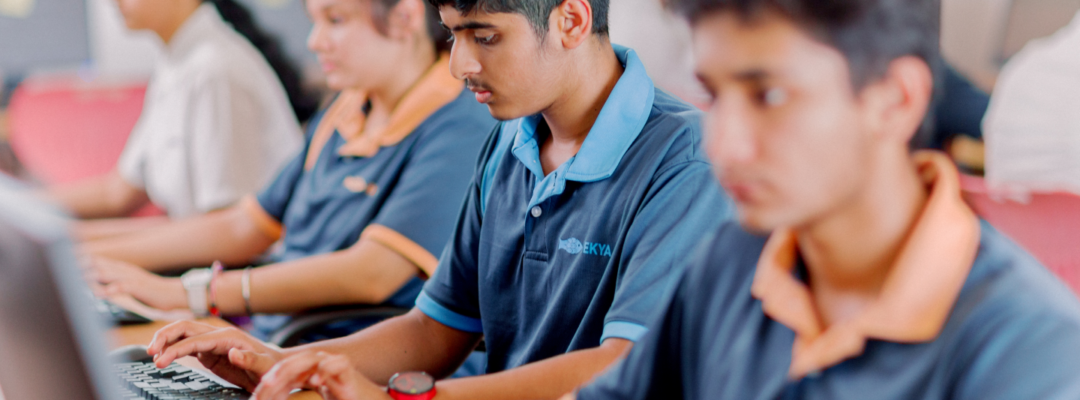
Unlocking a World of Opportunities: Discover the Computer Science Program at Ekya
Learning Area Purpose
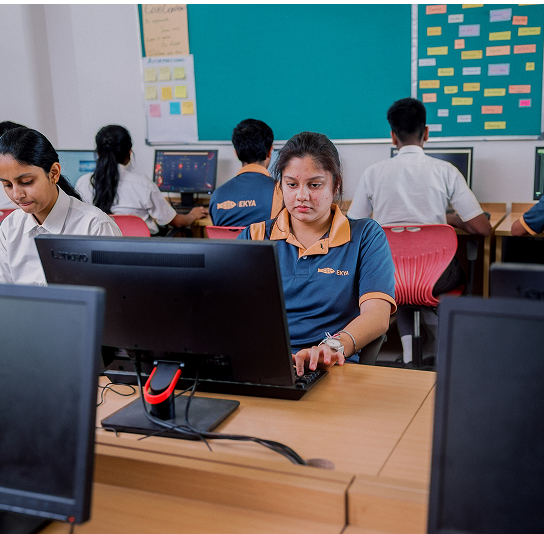
The Computer Science Program equips learners to:
- Be responsible, future-ready digital citizens.
- Collaborate, design, create and implement solutions to real-world problems using technology.
- Communicate ideas about technology and using technology.
- Use critical thinking and computational thinking processes to solve problems.
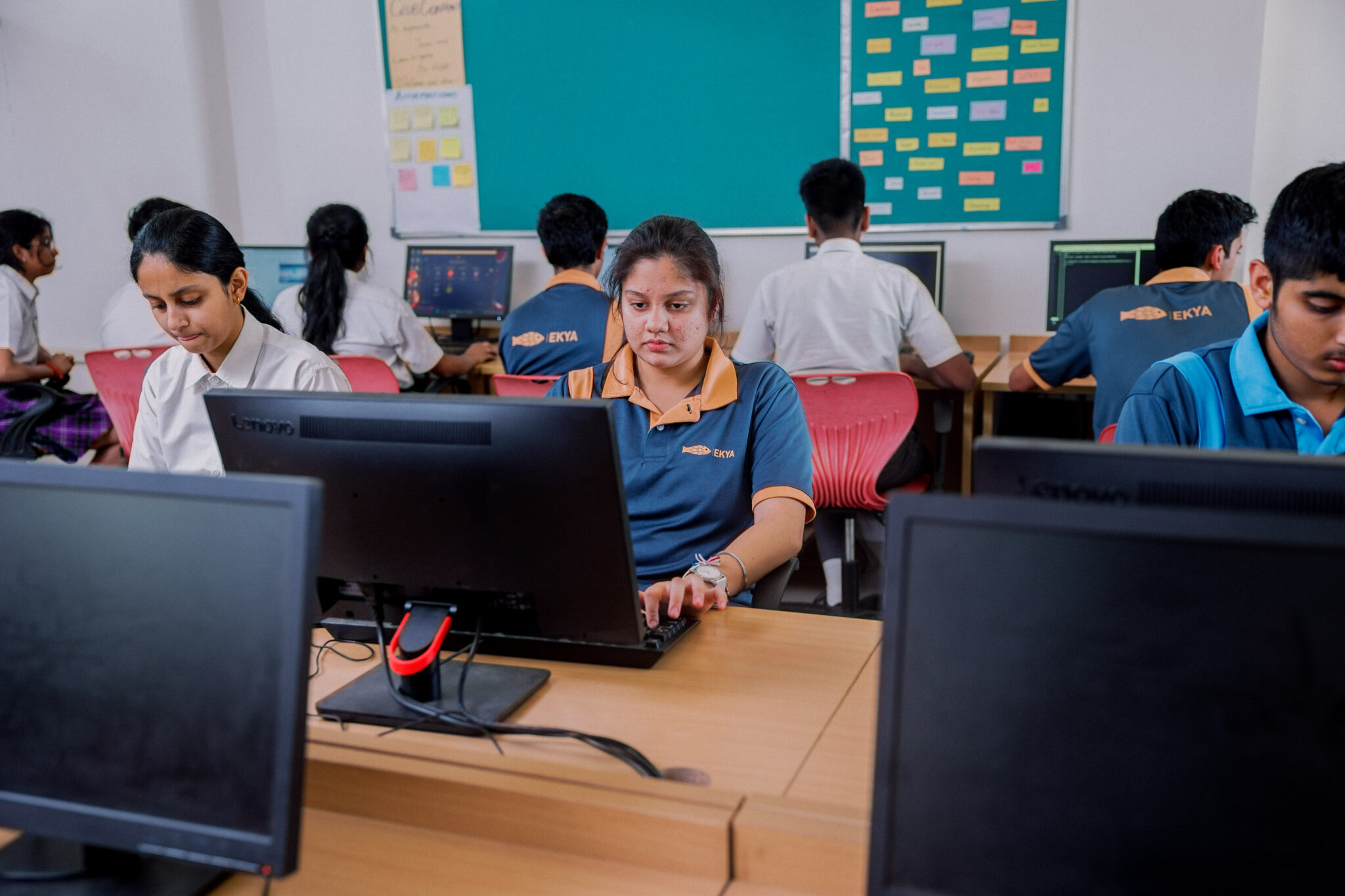
Our Computer Science curriculum is designed to provide students with a thorough understanding of the fundamental concepts and principles that underpin the digital world. From programming and web development to data analysis and networks, our lesson concepts equip students with the skills and knowledge necessary to navigate the ever- changing landscape of technology.
Core Topics Across Levels
Instruction covers essential subjects such as problem-solving, programming, physical computing, user-centred design, and data, tailored to Primary, Middle, and Senior blocks.

- Electronics and Arduino Exploration: Hands-on experience with Arduino allows practical application of coding and hardware interaction.
- Artificial Intelligence: Introduction to Artificial Intelligence concepts and their applications is provided.
- Google Workspace Integration: Utilisation of Google Workspace fosters collaborative and innovative learning experiences.
- Programming Proficiency: Skills are developed in block-based programming, HTML/CSS, Java, and Python.

Core Topics Across Levels
Instruction covers essential subjects such as problem-solving, programming, physical computing, user-centred design, and data, tailored to Primary, Middle, and Senior blocks.
Google Workspace Integration: Utilisation of Google Workspace fosters collaborative and innovative learning experiences.
Programming Proficiency: Skills are developed in block-based programming, HTML/CSS, Java, and Python.
Electronics and Arduino Exploration: Hands-on experience with Arduino allows practical application of coding and hardware interaction.
Artificial Intelligence: Introduction to Artificial Intelligence concepts and their applications is provided.
Skill Development
Our curriculum emphasises collaboration, communication, problem-solving, and computational thinking, utilising technology to enhance student experiences.
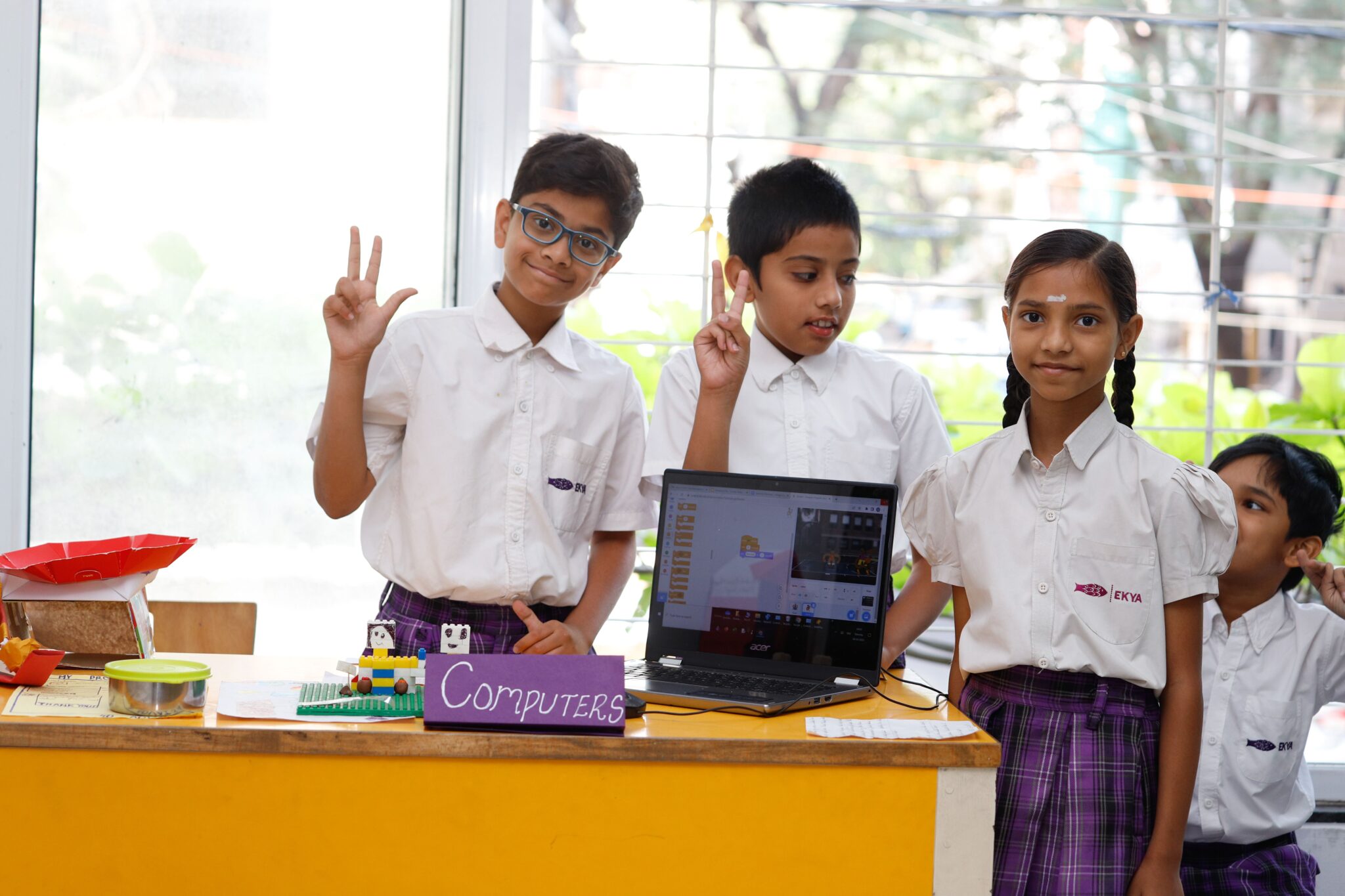
- Emphasis is placed on collaborative projects that build teamwork and interpersonal skills.
- Effective communication is cultivated through engaging presentations and discussions.
- Problem-solving is integrated across subjects to strengthen critical thinking abilities.
- Computational thinking principles are applied in practical, real-world contexts.
- Technology is used to create immersive and interactive learning experiences.
Skill Development

Our curriculum emphasises collaboration, communication, problem-solving, and computational thinking, utilising technology to enhance student experiences.
• Emphasis is placed on collaborative projects that build teamwork and interpersonal skills.
• Effective communication is cultivated through engaging presentations and discussions.
• Problem-solving is integrated across subjects to strengthen critical thinking abilities.
• Computational thinking principles are applied in practical, real-world contexts.
Design Thinking and Digital Citizenship
The focus is on nurturing responsible digital citizens and problem-solvers through design thinking challenges, rather than solely producing coders.
Our curriculum emphasises Digital Citizenship, educating conscientious digital citizens.
Students engage in authentic tasks that embrace Design Thinking Principles.
Collaborative projects provide opportunities to solve real-world problems.
Instruction on Ethical Technology Use is prioritised in everyday life.
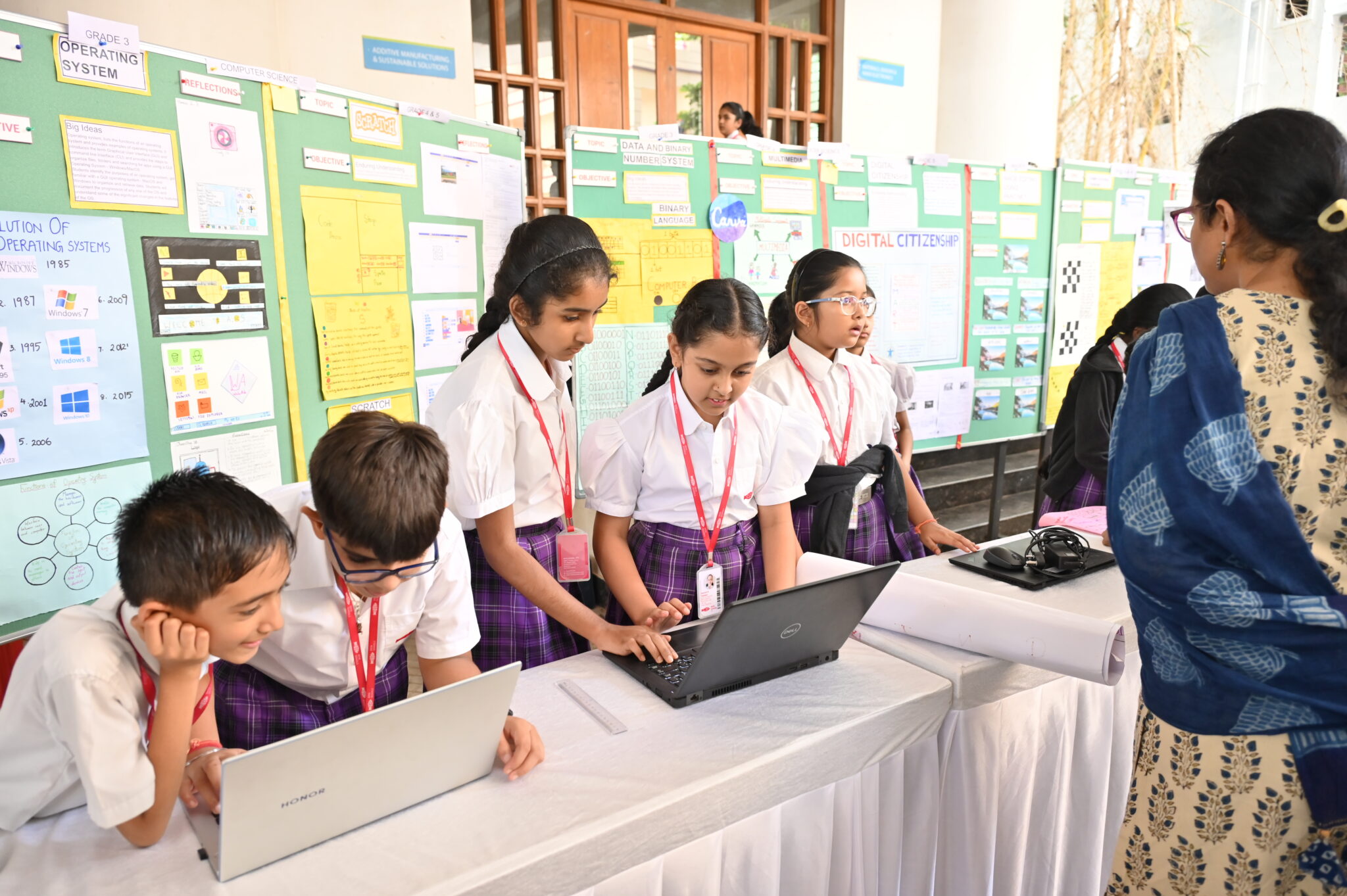

Design Thinking and Digital Citizenship
The focus is on nurturing responsible digital citizens and problem-solvers through design thinking challenges, rather than solely producing coders.
Our curriculum emphasises Digital Citizenship, educating conscientious digital citizens.
Students engage in authentic tasks that embrace Design Thinking Principles.
Collaborative projects provide opportunities to solve real-world problems.
Instruction on Ethical Technology Use is prioritised in everyday life.
Tools in the Computer Science Classroom
Developing programming skills requires effective debugging techniques. Here are some of Ekya’s valuable tools to enhance computer science skills.
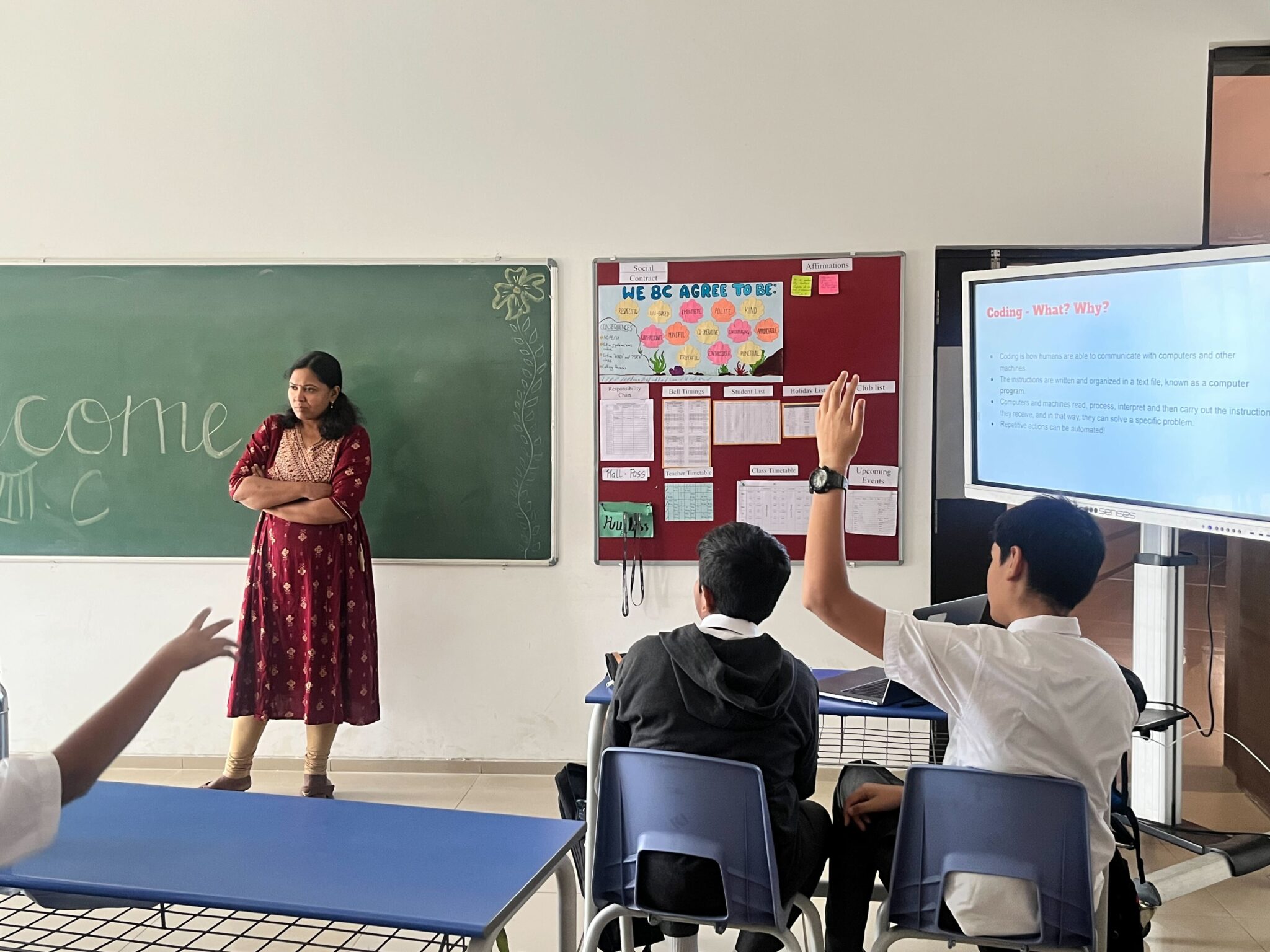
- Debug the Errors: Students identify and correct errors in code to enhance their debugging skills.
- Ask 3 Before Me: Encourages students to seek help from three peers before approaching the teacher, promoting collaboration.
- Predict the Output: Students make predictions about code execution outcomes, fostering critical thinking and understanding of programming logic.
- Errors and Fixes Organiser: A tool for documenting errors encountered and their solutions, helping students track their learning progress.
Tools in the Computer Science Classroom

Developing programming skills requires effective debugging techniques. Here are some of Ekya’s valuable tools to enhance computer science skills
Debug the Errors: Students identify and correct errors in code to enhance their debugging skills.
Ask 3 Before Me: Encourages students to seek help from three peers before approaching the teacher, promoting collaboration.
Predict the Output: Students make predictions about code execution outcomes, fostering critical thinking and understanding of programming logic.
Errors and Fixes Organiser: A tool for documenting errors encountered and their solutions, helping students track their learning progress.
Blogs
Show all
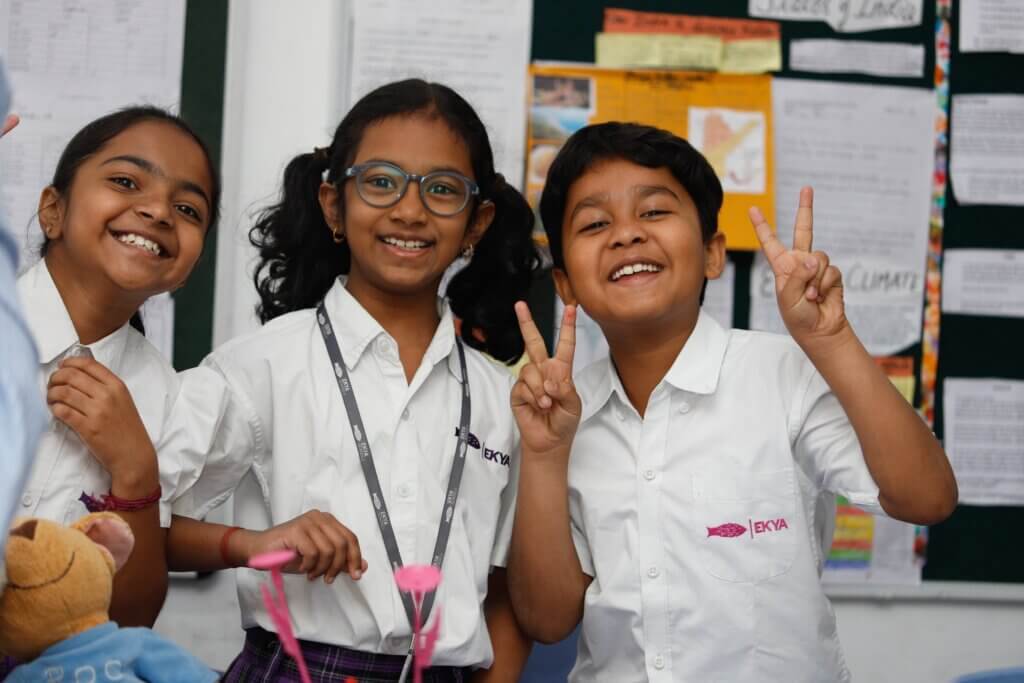
A Proven Framework for Success The ICSE curriculum at Ekya Schools represents more than an academic program – it’s a […]
Read moreLanguages Offered
| Category | Languages | Grades |
|---|---|---|
| First Language | English | Grades 1-12 |
| Second Languages | Kannada, Hindi, French | Grades 1-10 (French from Grades 5 & 6) |
| Third Languages | Kannada, Hindi, French | Grades 5-8 |
Learning Area Purpose
The Language program equips learners to:
- Make meaning of the language
- Understand a variety of texts and develop an informed appreciation for literature
- Communicate effectively and creatively, according to the medium and the audience
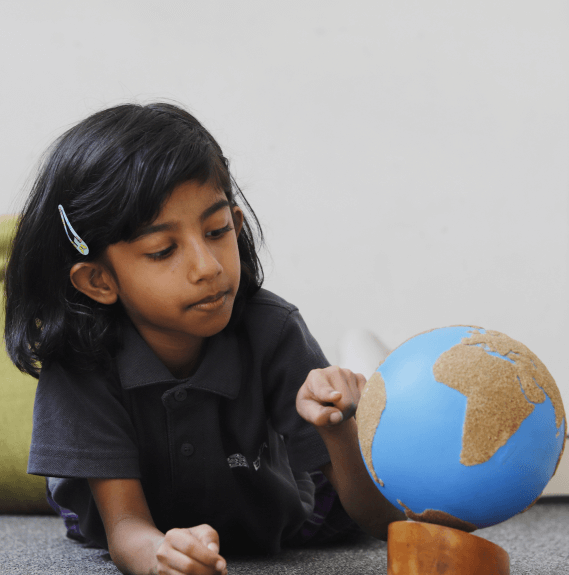
Key Learning Experiences
Love to Read Program
Ekya’s ‘Love to Read Program’ encourages students to explore new genres, authors, and stories, developing essential skills and fostering a lifelong love for reading. The program includes experiences such as –

- Author Talks: Our students engage with and draw inspiration from popular Authors
- Guided Levelled Reading Program: Implement a program to support all readers and their diverse reading abilities.
- Literary Circle: Foster literary engagement through the School’s Literary Circle.
- School Book Club: Participate in the School Book Club.
- Reading Initiatives: Introduce initiatives like Drop Everything And Read (DEAR) time, Reading Week, and Read-aloud events to promote reading.
- Ekya Publications: Curate and showcase student work through Ekya Publications.
- Creating Literature: Create literature to empower students to become confident writers.
Immersion into Fiction, Nonfiction, and Poetry
Ekya, through our language program, students will delve into diverse genres of books. Each student is distinct, so we encourage them to explore various genres and discover their ideal fit.

- Inclusion of Indian Authors: Award-winning Indian authors’ works are featured in contemporary Indian settings.
- Building Empathy: Diverse book titles help build empathy and understanding among students.
- Overview of the Book Plan: A plan designed based on international benchmarks and standards prepares students for various language uses.
- Grade-Specific reference books: Grade-specific books, such as ‘Sunita Williams- A Star in Space’ by Aravinda Anantharaman for Grade 5, are provided.
- Books About Books: Early grades start the year with stories that celebrate books and libraries, fostering a love for reading from a young age.
- Summer Reading Program- A structured summer reading program encourages children to read during school breaks.
Writing Process
The writing process is a significant part of the language program where all writing is treated as a creative act which requires time and positive feedback. Students use feedback to modify their work and have to return to the prewriting step to develop and expand their ideas.
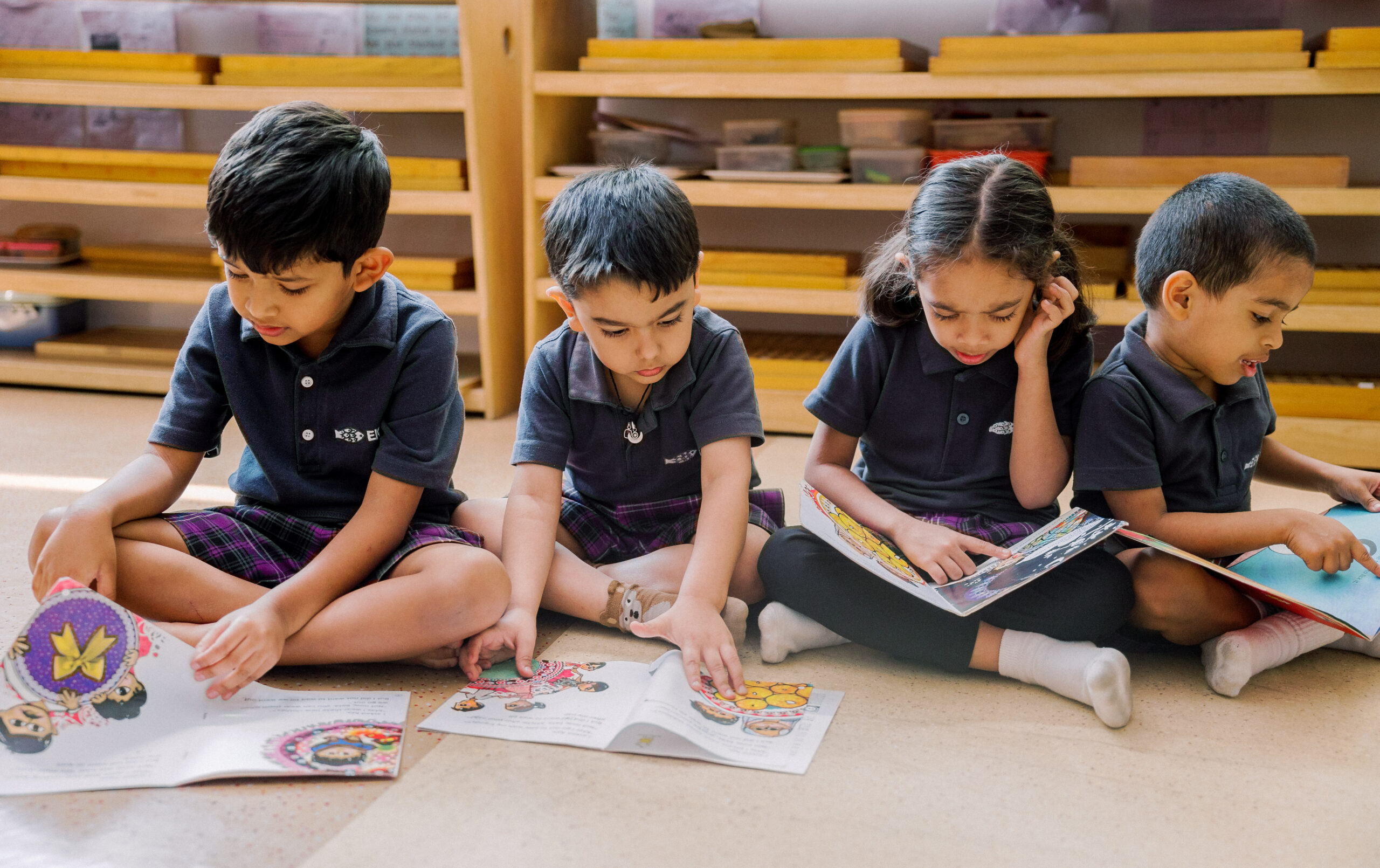
- Prewrite: Students generate ideas, choose a topic, and outline their approach.
- Research: Sources are identified, information is gathered, and findings are categorised.
- Draft: The next step is to write freely, review their work, and revise until satisfied.
- Revise: Then, paragraphs are reorganised, unclear language is replaced, and content is refined.
- Edit & Proofread: The final step involves reviewing formatting, grammar, and punctuation to ensure a polished product.
Language Tools
Ekya’s language program employs interactive techniques like Reader’s Theater and Author’s Chair to enhance literacy skills, foster creativity, and build community, making student thinking visible and deepening comprehension through peer collaboration.

- Reader’s Theater: Perform scripts to enhance reading fluency and comprehension.
- Reading Jigsaws: Read, summarise, and share sections of a text to piece together the full story.
- Author’s Chair: Share writing and receive feedback to build a supportive writing environment.
Computer Science

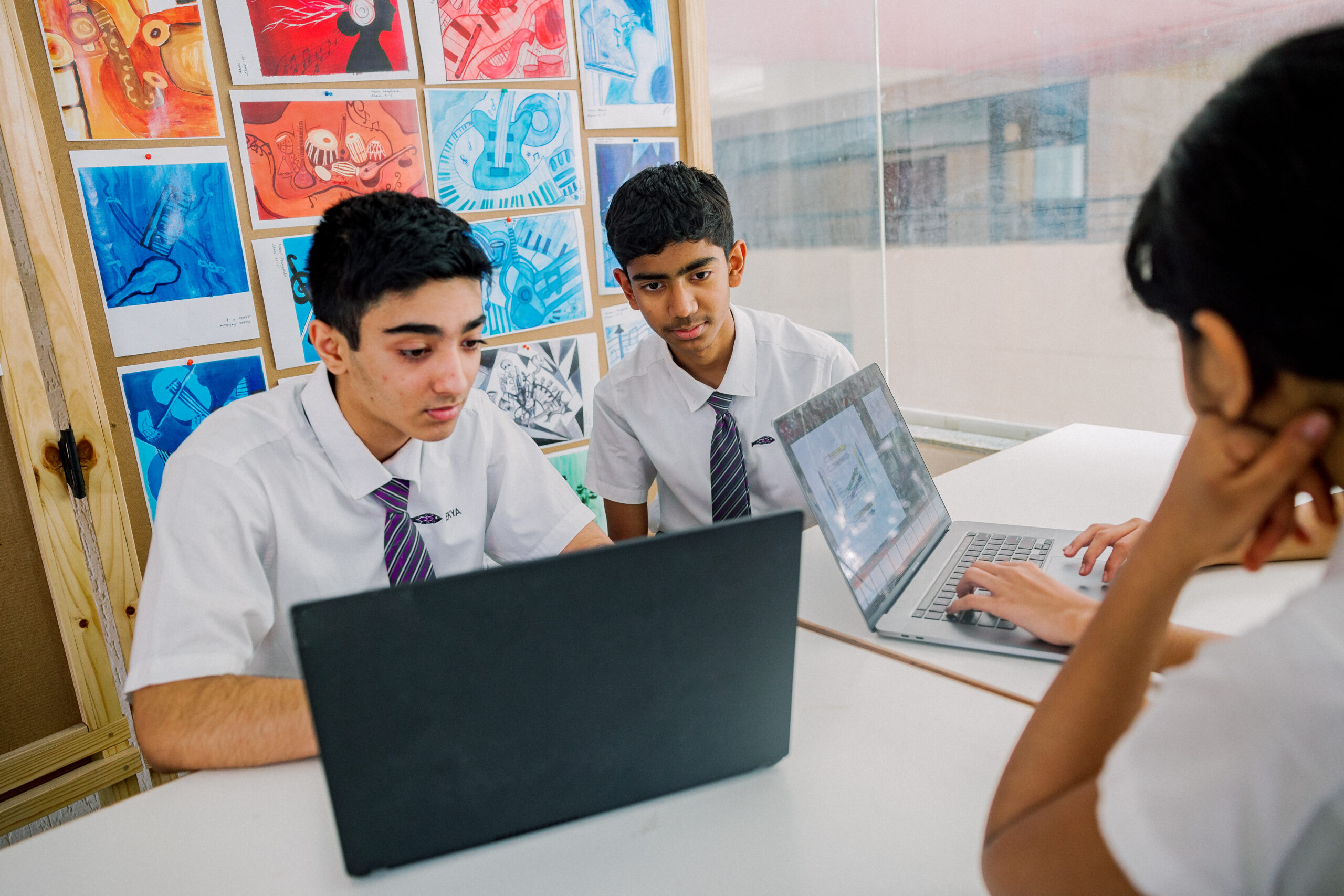

Learning Area Purpose
The Computer Science Program equips learners to:
- Be responsible, future-ready digital citizens.
- Collaborate, design, create and implement solutions to real-world problems using technology.
- Communicate ideas about technology and using technology.
- Use critical thinking and computational thinking processes to solve problems.
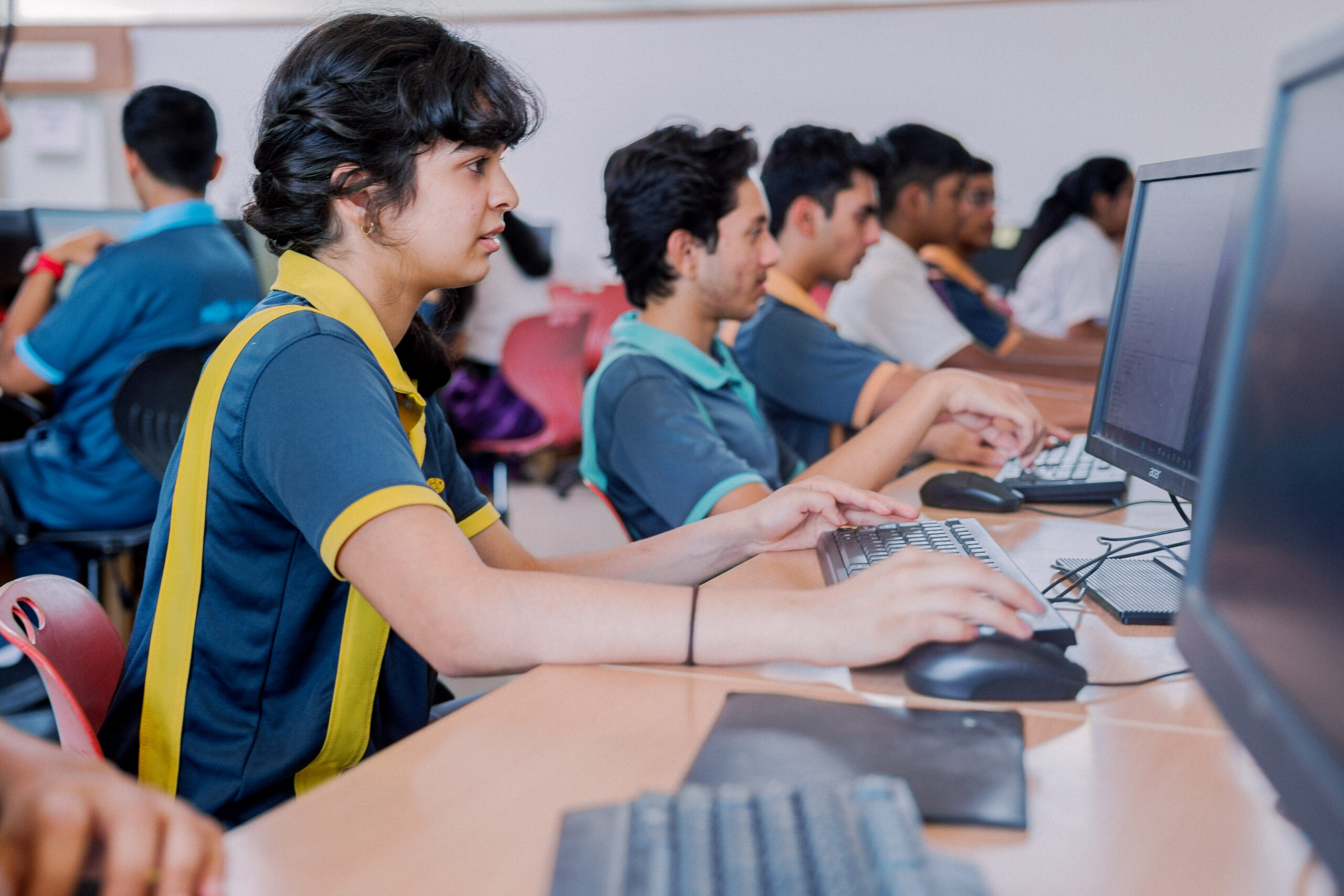
Key Learning Experiences
Core Topics Across Levels
Instruction covers essential subjects such as problem-solving, programming, physical computing, user-centred design, and data, tailored to Primary, Middle, and Senior blocks.

- Google Workspace Integration: Utilisation of Google Workspace fosters collaborative and innovative learning experiences.
- Programming Proficiency: Skills are developed in block-based programming, HTML/CSS, Java, and Python.
- Electronics and Arduino Exploration: Hands-on experience with Arduino allows practical application of coding and hardware interaction.
- Artificial Intelligence: Introduction to Artificial Intelligence concepts and their applications is provided.
Skill Development
Our curriculum emphasises collaboration, communication, problem-solving, and computational thinking, utilising technology to enhance student experiences.
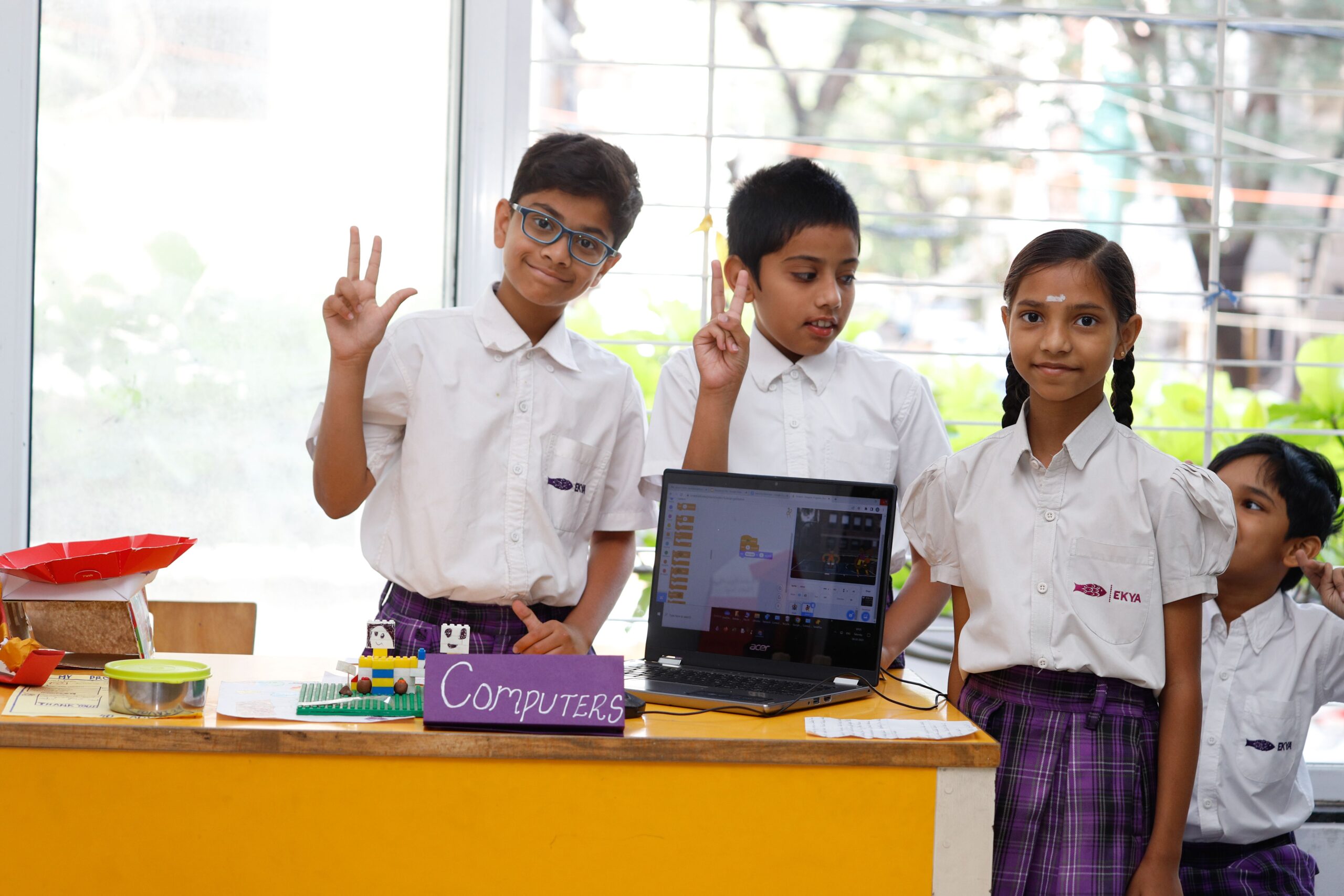
Emphasis is placed on collaborative projects that build teamwork and interpersonal skills.
Effective communication is cultivated through engaging presentations and discussions.
Problem-solving is integrated across subjects to strengthen critical thinking abilities.
Computational thinking principles are applied in practical, real-world contexts.
Technology is used to create immersive and interactive learning experiences.
Design Thinking and Digital Citizenship
The focus is on nurturing responsible digital citizens and problem-solvers through design thinking challenges, rather than solely producing coders.

- Our curriculum emphasises Digital Citizenship, educating conscientious digital citizens.
- Students engage in authentic tasks that embrace Design Thinking Principles.
- Collaborative projects provide opportunities to solve real-world problems.
- Instruction on Ethical Technology Use is prioritised in everyday life.
Tools in the Computer Science Classroom
Developing programming skills requires effective debugging techniques. Here are some of Ekya’s valuable tools to enhance computer science skills

- Debug the Errors: Students identify and correct errors in code to enhance their debugging skills.
- Ask 3 Before Me: Encourages students to seek help from three peers before approaching the teacher, promoting collaboration.
- Predict the Output: Students make predictions about code execution outcomes, fostering critical thinking and understanding of programming logic.
- Errors and Fixes Organiser: A tool for documenting errors encountered and their solutions, helping students track their learning progress.

